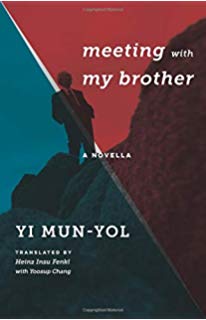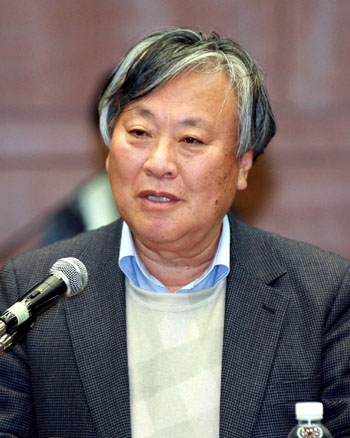Book Review: The Relevance of “Meeting with My Brother” Today

April 25, 2019
When we open up a book, we, as readers, usuallyfollow along, sometimes passively, with the writer’s imagination. Nevertheless, there is writing that sometimes forces an ordinarily acquiescent reader to seriously contemplate what role he or she would play in that story’s imagined reality. In South Korean author Yi Mun-yol’s 1994 novella, Meeting with My Brother, the narrator’s circumstances does just that: it forces the reader to consider the implications of potentially reunifying North and South Korea, which has become increasingly relevant over the past few years.
In this semi-autobiographical novella, Yi uses his characters’ dialogue and behavior to invite his readers to contemplate a reality in which they were either unaware of or hesitant to recognize. The South Korean narrator, the protagonist of this story, makes arrangements to meet with his half-brother in North Korea. Originally, the narrator wanted to meet with his father, who had defected to the North decades ago and started a new family. However, after learning of his father’s passing, the narrator, after some careful consideration, decides to meet with his half-brother.
Upon meeting, both are jealous of the other’s connection with their father. The South Korean narrator is the first-born child of their father and so, has a special status. On the other hand, the Northerner was able to grow up with this father who had abandoned his first family in the South. Although their first impressions of each other unveil the huge chasm between the two half-brothers, the meeting is still meaningful as it symbolizes reconciliation. Throughout their exchange, the inevitable costs, both economic and personal, of reunification are debated.

Novelist Yi Mun Yol
This novella presents an eye-opening view of the possible consequences that may arise from reunification. Being that this was my first time reading a piece of Korean literature, I did not know what to expect from the characters and the plot. However, I was pleasantly surprised by Yi’s portrayal of the characters as he beautifully conveyed the shared humanity of North and South Koreans. The long pages of dialogue between the narrator and his half-brother reveal their rich histories after the father had defected. My favorite quote from the novel is the narrator’s response to his brother’s frustrated questioning and angered confusion about the suffering that their late father left behind. The narrator responds:
“I don’t know either, dear brother. It was because I felt exactly as you’re feeling now, that we have innocently been the cause of each other’s suffering, that I shed tears on the shore of the Tumen River. All I know is that an era has passed, and that I have to take a radically different view of my life. I feel vaguely that one cannot blame anyone else for one’s sufferings, however little one deserved them.”
This quote reveals the similar experiences of suffering and pain that both families endured. I enjoyed reading about the narrator’s sentiment and overall opinion because it was a raw and insightful approach to the tension as well as developing relationship between the two. I particularly enjoyed the initially awkward conversation between the two brothers because it made me consider and appreciate the humanistic aspect of reunification rather than the economic or political facets.
Nonetheless, I would have liked the addition of more scenes of the narrator conversing with other characters, such as the rest of his family in the North. I think that learning more about the Northern family’s history would have been very interesting and would have added another complex dimension to the narrator’s relationship with the Northern family. Learning more about the culture and family dynamics in North Korea as opposed to the father’s behavior back in the South would expand upon the reader’s understanding of the political relations between the two nations as well as provide a refreshing view of family life in a country full of citizens thought to be belligerent and desperate due to the one individual dictating North Korea receiving all the media attention. The casual reader may be bored by the pages of narration about the narrator’s plans as well as the conversations the narrator engages in. However, I think that many BCA students would be intrigued and surprised by the overall message that Yi tries to convey to his readers–North and South Koreans both desire for a better future.
Even though you may not be particularly politically aware, it is highly probable that you have at least seen a news headline containing words such as “Korean Reunification” or “North and South Korea.” I think that this novella is a good read for anyone, including those who have little to no knowledge about this political issue because of Yi’s skillful brevity in conveying such a powerful idea. It is also short (only 120 pages), easy to understand, and fascinating. For those that do regularly follow the news, I think that this body of work may prove to be a useful and unique resource to keep in mind as we observe the current course of events regarding the Korean unification. But, regardless of whether or not you are politically aware, I think that the majority of BCA students would find this brief yet impactful book a worthwhile read.





Chris Kim • May 9, 2019 at 3:19 pm
I appreciate that Michelle at least indirectly understood the pain of inter-Korean division by reading this book as I felt indirect. This book symbolizes the pain of some Korean family in Korea even now.